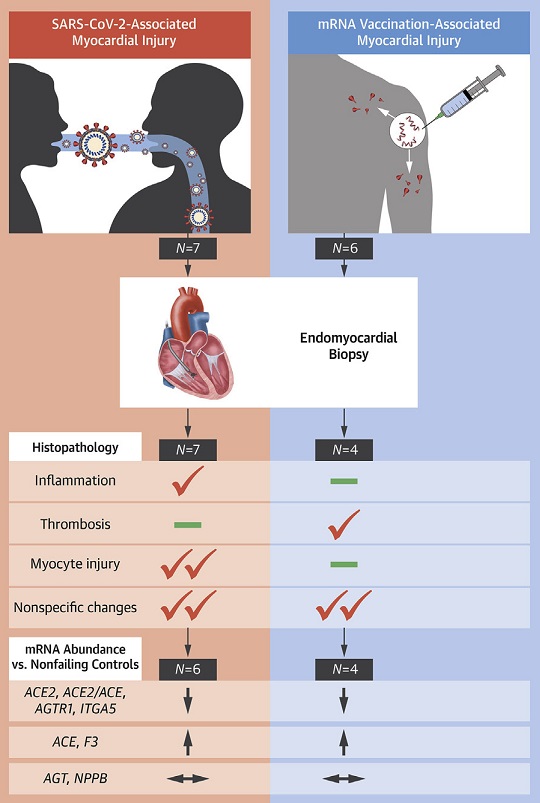Colorado Study Shows That Both COVID-19 Infections And mRNA Vaccination Causes Altered Gene Expression And Myocardial Injury
Nikhil Prasad Fact checked by:Thailand Medical News Team Mar 22, 2024 1 year, 10 months, 3 weeks, 1 day, 4 hours, 22 minutes ago
COVID-19 News: The global healthcare landscape has been profoundly affected by the COVID-19 pandemic, with extensive research focused on understanding the pathophysiology of SARS-CoV-2 infection and its implications on human health. Notably, emerging evidence suggests a potential link between COVID-19 infection and myocardial injury, alongside observations of similar myocardial manifestations in individuals receiving mRNA-based vaccines against SARS-CoV-2. A comprehensive study conducted at the University of Colorado Anschutz Medical Campus in the USA that is covered in this
COVID-19 News report, sheds light on the molecular mechanisms underlying myocardial injury associated with both COVID-19 infection and mRNA vaccination, highlighting important implications for clinical management and future research directions.
 Graphical Abstract - Both COVID-19 Infections And mRNA Vaccination Causes Altered Gene
Graphical Abstract - Both COVID-19 Infections And mRNA Vaccination Causes Altered Gene
Expression And Myocardial Injury
Introduction to Myocardial Injury in COVID-19 and mRNA Vaccination
SARS-CoV-2, the causative agent of COVID-19, gains entry into host cells through its Spike (S) protein binding to angiotensin-converting enzyme (ACE) 2, a crucial enzyme expressed in various tissues, including the heart. Interestingly, mRNA vaccines developed against SARS-CoV-2 also encode the Spike protein, thus mimicking the natural viral entry mechanism. This study aimed to explore the molecular alterations in gene expression associated with myocardial injury in individuals with recent COVID-19 infection or mRNA vaccination.
Clinical and Histopathologic Findings
The study encompassed two cohorts: COVID-19 patients with myocardial injury (n=7) and individuals experiencing myocardial injury post-mRNA vaccination (n=6). Clinical assessments revealed elevated biomarkers of myocardial injury, such as Troponin I (TnI) and Brain Natriuretic Peptide (BNP), in both groups. Imaging modalities, including cardiac magnetic resonance (CMR) imaging, showed characteristic features suggestive of myocarditis in several cases. However, histopathologic analyses revealed variable findings, ranging from myocarditis to nonspecific abnormalities and even absence of significant pathology in some cases, challenging the conventional diagnosis of myocarditis.
Gene Expression Analysis
Despite the diverse histopathologic findings, gene expression analysis unveiled consistent molecular changes across both cohorts. Notably, there was a significant down-regulation of ACE2, the cellular receptor for SARS-CoV-2, in myocardial samples from COVID-19 patients and post-vaccination individuals compared to control samples. This down-regulation was accompanied by an up-regulation of ACE, leading to a dysregulated ACE2/ACE ratio, which could contribute to myocardial dysfunction and inflammation.
Furthermore, other genes implicated in myocardial dysfunction, inflammation, and thrombosis showed altered expression patterns, including AGTR1, ITGA5, and tissue factor (F3). The
se gene expression changes were remarkably similar between COVID-19 and post-vaccination myocardial injury patients, suggesting a common molecular pathway despite differing triggers (i.e., viral infection vs. vaccine-induced immune response).
Implications and Future Directions
The study findings have several implications for clinical practice and future research endeavors. Firstly, the identification of shared molecular alterations in myocardial injury post-COVID-19 infection and mRNA vaccination underscores the need for vigilant monitoring of cardiac health in both scenarios. Secondly, the dysregulation of ACE2/ACE ratio and other associated genes highlights potential targets for therapeutic interventions aimed at mitigating myocardial damage and associated complications.
Moving forward, larger-scale studies are warranted to validate these findings and elucidate the precise mechanisms driving myocardial injury in these contexts. Additionally, long-term follow-up studies will be crucial to assess the durability of gene expression changes and their implications for cardiac function and patient outcomes.
Conclusion
In conclusion, the study provides valuable insights into the molecular pathophysiology of myocardial injury associated with COVID-19 infection and mRNA vaccination. By uncovering common gene expression alterations, this research paves the way for targeted therapeutic strategies and emphasizes the importance of ongoing surveillance for cardiac complications in individuals exposed to SARS-CoV-2, either through infection or vaccination. Further investigations are needed to fully comprehend the intricacies of myocardial injury in the context of COVID-19 and mRNA vaccination, guiding evidence-based clinical management and preventive measures.
The study findings were published in the peer reviewed journal: JACC: Basic to Translational Science
https://www.sciencedirect.com/science/article/pii/S2452302X22003278
For the latest
COVID-19 News, keep on logging to Thailand Medical News.
